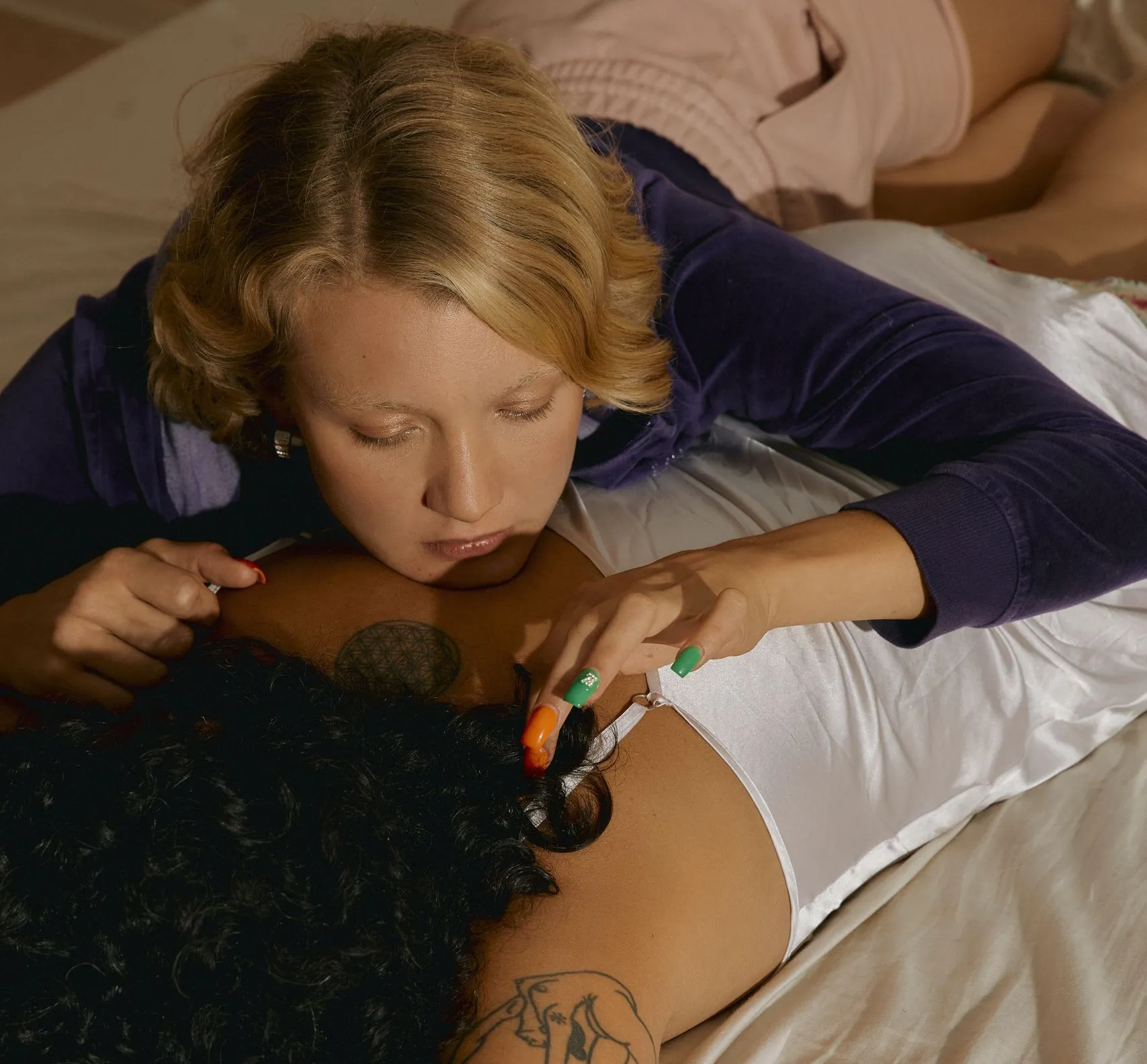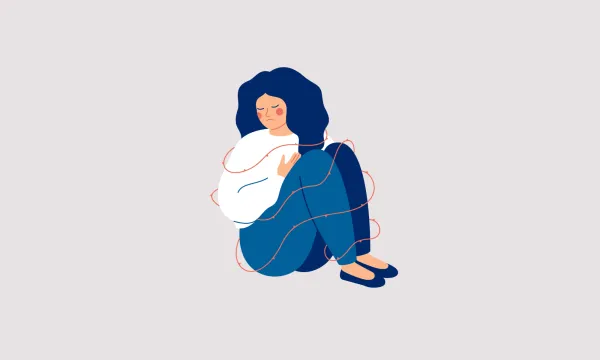You feel the connection instantly. Sparks fly, and you swear you’ve found the ‘one’. The constant contact, phone calls, and non-stop texts make you feel giddy. New love, right? You and your new romantic partner become the couple that makes everyone around them feel disgustingly single.
You’re practically joined at the hip. Friends and family can hardly tell you apart anymore - you’ve basically melded into one big hermaphroditic blob. It’s all part of the bonding process, you reason.
Over time, clingy relationships stop being fulfilling experiences and become sources of psychological distress. Despite doing everything to keep your partner happy, you just can’t seem to get anything right. And as a result, your mental health deteriorates.
So, what do we know about clingy relationships?
Things to know
- Clingy relationships are born out of insecure attachment styles and can result in a loss of identity and emotional exhaustion.
- Your clingy partner might need lots of validation, be jealous, or complain that you're "not putting the relationships first."
- You might have to end your clingy relationship to give your partner the space to learn how to be independent or encourage them to seek out a therapist.
Constantly meeting your partner’s excessive demands for attention and validation has left you emotionally drained. When you think of your partner, images of a toddler mid-tantrum flash through your mind…not sexy.
What does it mean when your partner becomes overly dependent on you for attention, validation, and emotional support? Well, they might act like a puppy, but clinginess can be understood as manipulation.
If your new relationship suddenly feels like a juggling act, you may be dealing with a clingy partner. Here's what we'll be discussing:
- Understanding Clingy Relationships
- Signs You Might Be In A Clingy Relationship.
- How To Spot a Clingy Partner
- What Makes a Partner Clingy?
- Your Partner Is Clingy, Now What?
Understanding Clingy Relationships
Let’s admit it, relationships are a big deal. As humans, our very existence relies on relationships. Healthy relationships are said to have a host of benefits that contribute to our well-being. Romantic relationships, in particular, are proven to reduce stress and encourage personal development.

Dysfunctional relationships, on the other hand, are destructive and can have many negative psychological effects. Because clingy relationships are characterized by intense, almost obsessive demands for interaction and reassurance, they are inherently dysfunctional.
Clingy relationships can feel like emotional rollercoasters. As partners sink further into the dysfunctional relationship dynamic, the following negative effects can set in:

Resentment
Resentment is a dangerous cocktail of anger, frustration, and bitterness. According to experts, it is a natural response to a sense of being wronged. In a clingy relationship, you and your partner may feel wronged but for very different reasons. Your partner may feel like you do not value them while you may feel like you are being victimized.
Did they really have to ignore you for four days over that lunch you had with your best friend? Or sulk for hours over a missed call? If left to fester, resentment can cause major rifts and lead to explosive conflict.
Lasting feelings of inadequacy
It's hard not to feel inadequate when all of the relationship’s woes are supposedly your fault. Being around your partner is like walking on eggshells. You never know what might set them off.
Even when you do your best to meet their ridiculous demands, your clingy partner still subjects you to accusations of infidelity and neglect. Over time your self-confidence takes a knock and your self-esteem hits an all-time low. Sadly, these feelings of inadequacy can linger long after a clingy relationship has ended.
Emotional exhaustion
Your partner uses shame and guilt to manipulate you into spending all your time, energy, and resources on the relationship. Despite constantly needing to provide them with emotional support, you receive no emotional support in return. Eventually, you are left emotionally exhausted.
A loss of identity
Remember that hermaphroditic blob? Clingy relationships are notorious self-identity killers. When you spend all your time trying to keep up with the demands of a clingy relationship, your interests, and personal relationships suffer. After a while, you’re barely able to recognize yourself.

Eventually, you don’t even remember what life was like before you met your clingy partner. Each day in clingy relationship hell becomes a painful reminder of all the things you’ve sacrificed for the sake of the relationship.
A decline in physical and mental health
Like all dysfunctional relationships, clingy relationships can adversely affect an individual’s physical and mental health. The negative effects on your mental and physical well-being could include anxiety, disturbed sleep, a weakened immune system, high blood pressure, and high blood sugar levels.
Signs You Might Be In A Clingy Relationship.
You might be in a clingy relationship if:
- Your partner has become increasingly dependent on you.
- The relationship is progressing at an unhealthy pace.
- Keeping up with ‘relationship’ demands is draining you physically and emotionally.
- Your partner is manipulative and often makes you feel guilty for not putting ‘the relationship’ first.
- You’re spending less time with friends and family to appease your partner's needy nature.
- Your partner does not respect your personal space. They use social media, location monitoring apps, texts, and calls to constantly keep tabs on you.
- You and your partner are experiencing a lot of negative emotions due to the relationship.
Because clingy relationships are characterized by intense, almost obsessive demands for interaction and reassurance, they are inherently dysfunctional
How To Spot a Clingy Partner
A clingy person exhibits needy behaviors and clingy tendencies that can frustrate even the most patient and understanding partner.

1. They are extremely demanding
Clingy partners want to be involved in everything you do. They demand all of your time.
A typical day involves responding to countless calls, texts, or even emails about where you are and who you’re with. Got a work thing? They sulk about not being able to join you. Meeting up with friends? They accuse you of neglecting their emotional needs. Any time spent apart tends to cause extreme anxiety and triggers their fear of abandonment.
2. They are jealous of everyone and everything
You can’t remember the last time you made time for yourself, let alone your family and friends. Your partner’s demands for attention have caused you to neglect your own interests and other important relationships in your life. They are jealous of any attention that isn’t directed towards them and will grill you about your interactions with different people.
3. They need constant validation
Clingy partners need constant reassurance of their position in your life. Insecurity often leads them to believe that they are not valued and that at any time, they could be abandoned.
This fear may translate to attempts to smother you and other over-the-top displays of affection. A clingy partner may even attempt to skip the stages of healthy relationship development and pressure you into more serious forms of commitment too soon.
4. They do not understand the concept of personal space
You ask for some alone time and immediately notice the change in your partner’s body language. They look at you like you’ve grown a second head and cannot seem to understand the strange request.

To a clingy partner, asking for time alone or trying to get them to respect your personal space is a catastrophic event and signals that you are attempting to pull away from them.
5. They have no life apart from you
You can’t seem to figure out who your partner is outside of the relationship. They have discarded their friends, interests, and hobbies to spend more time with you. Romantic partners are encouraged to have common interests but lately, your partner's identity seems to have just merged with yours.
Your partner now likes all the things you like and just agrees with everything you say. They're adamant that they're enjoying book club even though you've caught them falling asleep there many times.

What Makes a Partner Clingy?
They have an anxious attachment style
Attachment theory explains why some adults are more clingy than others in relationships. Psychoanalysts John Bowlby and Mary Ainsworth first observed the effect of caregiver behaviour on infants' emotional responses and attachment styles.
Even though their research focused on exploring the dynamics of infant-caregiver relationships, their findings on attachment systems were later applied to the study of romantic relationships.
It is now widely accepted that a person's level of security in adult relationships is influenced by early experiences with their primary caregivers. Clingy partners exhibit traits commonly associated with an anxiety-based attachment style. This means they tend to obsess over their romantic partner’s availability, attentiveness, and responsiveness.
They are insecure in their romantic relationships and constantly seek reassurance because of a fear of abandonment rooted in early childhood.
They’re carrying baggage from previous relationships
Remember that abusive relationship that broke you? Or that ex who cheated on you? If your partner has experienced heartbreak, abuse or infidelity, chances are, their ability to feel secure in relationships has been affected.
Heartbreak and negative experiences from past relationships can change us in many ways. We become guarded and it's harder for us to trust or feel safe in intimate relationships. Even in individuals who grew up with a secure attachment style, infidelity and betrayal in romantic relationships can lead to insecurity and trust issues.
They have low self-esteem
A partner with low self-esteem usually feels unworthy of the love they receive, and trembles at the thought of being abandoned. Clingy behavior might be your clingy girlfriend or boyfriend’s way of seeking validation or proving their worth to you.

They may have Dependent Personality Disorder
Dependent personality disorder (DPD) is one of 10 different types of personality disorders. A personality disorder affects a person's thoughts, feelings, and behaviors over time.
DPD may develop in childhood due to a traumatic incident or by the age of 29 due to a complex set of life experiences. A person with DPD may feel overwhelmed by the prospect of taking care of themselves and depend on their partner to make decisions for them. Their behavior is perceived as clingy or needy as they tend to rely on their partners for reassurance and emotional support.
Your Partner Is Clingy, Now What?
In clingy relationships, communication is essential due to fundamental differences in how each partner views relationships. Secure partners are confident people who view relationships as positive experiences.
In contrast, clingy partners are anxious people whose negative outlook on relationships often affects the way they relate to romantic partners. Understand that your partner’s behavior comes from a place of fear. Let them know how their behavior is affecting you and the relationship.

Your partner may have a difficult time coming to terms with the fact that their efforts are sabotaging the relationship and may even use denial as a defense mechanism.
Allow them to reflect on their actions and try to come up with ways to make positive changes to the relationship together.
Encourage your partner to seek professional help
If your partner’s behavior is a result of a personality disorder, encourage them to seek professional help.
If they are dealing with a maladjusted attachment system, encourage them to speak to a professional about their anxiety and how to transition to a more secure attachment style.
Give each other breathing room
Relationships that are too clingy can easily turn into co-dependencies. Encourage each other to grow and be independent outside the relationship.
Work with your partner to establish healthy boundaries and be intentional about spending time apart or with your friends and family.
Swipe left on the relationship
If you've tried talking to your partner, and they won’t see reason, or if you’ve given them ample opportunity to change their behaviour and they don’t, it just might be time to swipe left on the relationship.









